Key Takeaways
- Hiring a Developer: App developer costs vary by region, experience, and project needs. In North America, rates range from $37 to $77 per hour, while Southeast Asia offers more affordable options between $8 and $45 per hour. Central and Eastern Europe balance cost and quality well, with rates from $19 to $55 per hour.
- Experience and Skills: A developer’s expertise impacts software development costs. Entry-level developers charge $15 to $40 per hour, mid-level developers range from $40 to $80, and senior developers with specialized skills can charge $80 to $150 or more. In-demand skills like AI, blockchain, or AR/VR may increase costs.
- App Type and Complexity: Simple apps cost between $10,000 and $20,000, while complex apps like eCommerce or social platforms can exceed $300,000 due to advanced features and integrations. The type of app and its complexity influence the cost significantly.
- Platform Choice: The app development process varies by platform. iOS development tends to be more affordable due to shorter testing cycles, while Android development may require more device testing. Cross-platform development can reduce costs by allowing one codebase to work on both iOS and Android.
- Pricing Models: The best app developers may charge through hourly rates, project-based pricing, or retainer agreements. Hourly rates suit projects that may evolve, fixed-price models work well for projects with a defined scope, and retainers provide dedicated resources for long-term support.
- Additional Costs: Outsourcing app development may include extra expenses for onboarding, equipment, and security, ensuring quality across the development process.
Key Factors Influencing App Developer Costs
Regional Pricing Differences
When looking at the app developer cost, where developers are based can greatly impact rates.
Mobile app developer prices vary widely across the globe, and understanding these differences can help you plan a budget that suits your needs.
Many app development companies in different regions set prices according to local demand and expertise.
In North America, app development costs range between $37 to $77 per hour in the United States and $31 to $65 per hour in Canada.
These higher rates are often associated with the specialized skill set and extensive experience of developers based there.
Western Europe also sees varying hourly costs. In countries like the UK, Germany, France, and the Netherlands, rates range from $25 to $100 per hour, while Switzerland generally costs more, averaging $54 per hour.
Northern Europe’s app development costs are more uniform, ranging from $30 to $58 per hour across Norway, Sweden, and Finland.
Southern Europe, including Spain, Portugal, and Italy, generally offers more affordable rates from $20 to $50 per hour.
In Central and Eastern Europe, such as Poland, the Czech Republic, Ukraine, and Belarus, hourly rates fall between $19 and $55, making this region an option for budget-conscious projects with a favorable price-to-quality ratio.
Southeast Asia, known for its affordability, offers rates between $8 and $45 per hour, with Singapore on the higher end at $25 to $60 per hour.
Similarly, in South America, developers in Brazil, Argentina, and Colombia charge between $18 and $52 per hour, which can compare favorably with Central and Eastern Europe.
The developer in the US tends to charge higher hourly rates due to local market demands and skills.
In the Middle East, prices range from $19 to $75 per hour, with Israel generally being the most expensive location.
Oceania, including Australia and New Zealand, sees rates of $29 to $65 per hour, similar to North America, with costs reflecting the living expenses in these regions.
Knowing these hourly rates for app developers across regions can help you choose the most cost-effective location for your project.
Experience and Skill Level
The experienced developer you choose will significantly impact the cost of mobile app development.
A developer's experience level and specific skills make a difference in cost and completion speed for your project.
An entry-level developer with zero to two years of experience generally charges between $15 and $40 per hour in the US, and between $25 and $40 in other regions.
Entry-level developers are typically proficient in basic Android and iOS platforms, with a good understanding of UI/UX.
Mid-level developers with two to five years of experience charge between $40 and $80 per hour and are more skilled in specific platforms like iOS (Swift, Objective-C) and Android, as well as in using testing tools.
With experience in skilled app developers, mid-level expertise helps manage moderate complexity tasks.
At a senior level, five or more years of experience brings hourly rates to between $80 and $150, with deeper expertise in frameworks, testing, and building scalable architectures.
Senior developers are often the best choice for complex projects, as they can complete tasks quickly and efficiently.
Developers with specialized skills, such as AI, blockchain, or AR/VR, may charge even more.
This reflects the unique skill set required, which is often in demand but limited in supply.
The app developer for your project will often depend on the type of developer you need, whether freelance or agency, as agencies generally charge more but provide team support and additional resources, which can affect the overall cost of app development.
App Complexity and Scope
When planning your app project, knowing the app complexity and scope can give you a better idea of the time and budget needed.
Different types of mobile app development projects vary in cost based on features, integrations, and complexity.
A simple app with basic functions and minimal integrations typically requires 200 to 400 hours of work, resulting in an app development cost between $10,000 and $20,000.
Apps with moderate complexity, including more features and moderate integrations, might need 500 to 800 hours and can cost between $25,000 and $40,000.
Complex apps with advanced features, such as real-time data and extensive third-party integrations, can take over 1,000 hours, with costs starting at $50,000.
Gaming and social media apps generally cost more due to high resource needs, with budgets for these apps reaching from $300,000 to over $1 million.
Apps that are highly complex, like eCommerce or on-demand services similar to Uber, often have additional expenses for real-time data and secure user data storage.
Understanding how app scope impacts app costs helps in creating an accurate app development budget.
Operating Platform (iOS, Android, Cross-Platform)
The iOS app or Android app developer you choose can affect costs, as each platform has unique challenges.
Developing for iOS tends to cost between $30 and $60 for entry-level developers and up to $150 or more for senior developers.
iOS development is often more affordable than Android, as iOS development cycles tend to be shorter, reducing overall time and cost to hire app developers.
Developing for Android can cost $25 to $90 per hour, depending on complexity and the developer’s experience level.
Android apps generally require more extensive testing across multiple devices, which may increase costs.
iOS and Android app development each have their own factors, and choosing between them depends on your target audience and device compatibility.
Cross-platform development, on the other hand, can offer cost savings, as frameworks like Flutter and React Native allow you to create apps that work on both iOS and Android.
A cross-platform app typically costs between $40 and $120 per hour, depending on the developer’s expertise.
This approach can be more budget-friendly than creating separate native apps, but it may come with trade-offs in performance and customizability, especially if your app relies on platform-specific features.
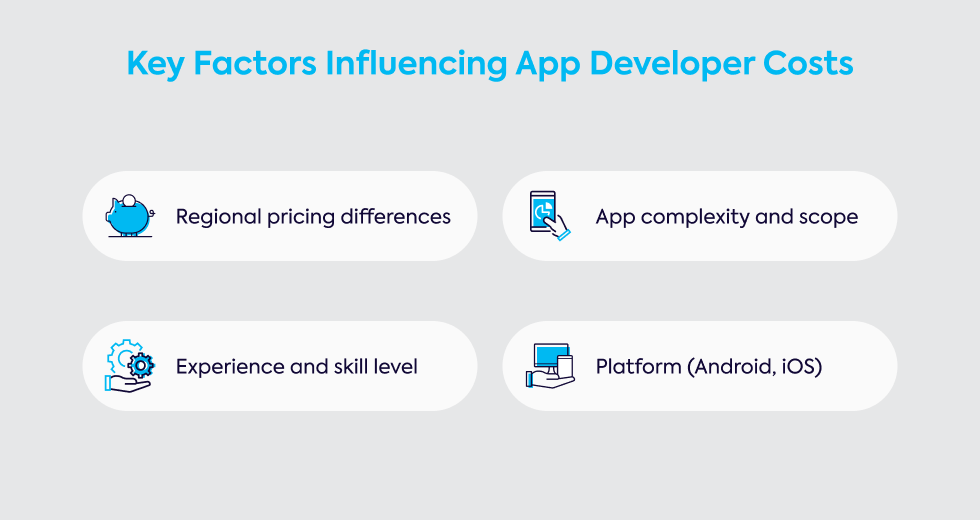
How App Developers Charge for Their Services
Hourly Rates
Understanding how app developers charge can help you set realistic expectations.
The cost of app development varies by factors such as location, experience, and skill level, with hourly rates reflecting these aspects.
For example, entry-level developers may charge between $15 and $40 per hour, reflecting their limited experience, while mid-level developers with two to five years of experience can charge between $40 and $80 per hour due to their skills in key frameworks and libraries.
Senior developers, who have five or more years of experience, charge between $80 and $150 per hour, as they bring specialized knowledge in app architecture and advanced debugging.
In North America, developers generally charge from $60 to $150 per hour, with experienced professionals occasionally charging more than $150 for complex projects.
In Southeast Asia, hourly rates are lower, ranging from $8 to $50, with the rate for mobile app developers in India averaging around $25 per hour.
Developers with in-demand skills, such as AI or blockchain, often command higher rates across all regions.
An hourly rate model offers flexibility, making it ideal for projects that may evolve or where requirements can change.
Understanding the costs when hiring app developers and having an idea of how much these rates vary can help you choose a billing model that aligns with your project.
Project-Based Pricing
Another common pricing model in app development project costs is project-based pricing.
This option is often suitable for projects with well-defined goals and fixed-price project costs that are based on scope, complexity, development phases, and expected deliverables.
For a simple app, where basic features are needed, you might expect to pay between $10,000 and $20,000.
Moderate apps, which come with additional features and some integrations, could cost between $25,000 and $40,000.
Complex apps, especially those requiring custom UI/UX and extensive backend development, can exceed $50,000, sometimes reaching up to $1 million for large-scale apps.
Project-based pricing offers predictability in both costs and timelines.
However, if there are changes to the app’s scope or requirements, these will likely require renegotiation of the terms, which can add to the total cost.
Retainer Agreements and Long-Term Contracts
For projects needing regular updates or consistent development over time, long-term developer agreements or retainer contracts may be a better fit.
Retainer agreements provide dedicated app developers for a fixed monthly fee, ensuring ongoing resources are allocated to your project.
Retainer agreements often benefit larger projects requiring months of development and post-launch support.
They generally include a formal contract detailing services, rates, and the flexibility for scope adjustments.
Advantages of retainer models include stable developer availability, continuous support, and long-term project continuity.
Retainers for app developers and agreements with app development agencies offer reliability, especially for projects needing extended development support and a developer for ongoing projects that may extend beyond the initial launch phase.
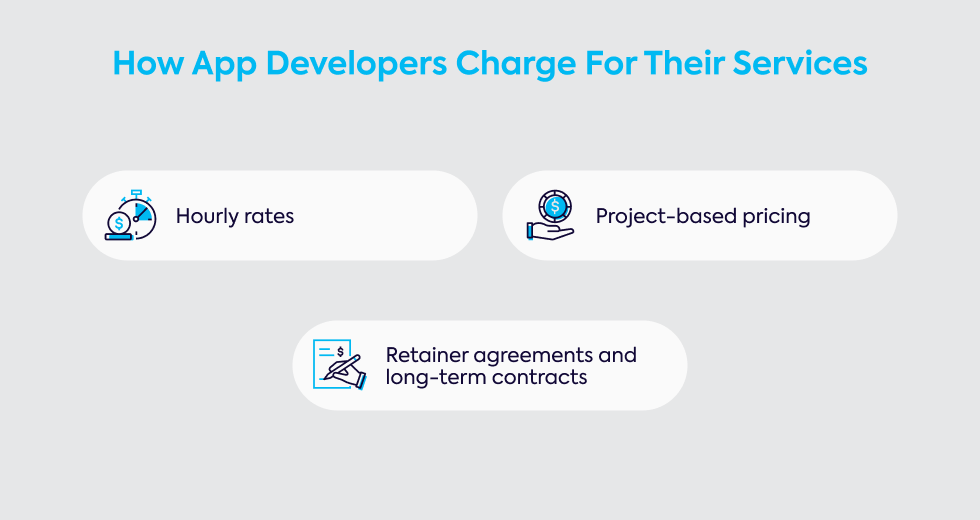
Estimating Your App Development Cost
Defining the Project Scope and Requirements
To accurately estimate your app development cost, it’s important to define your app idea in detail.
Understanding the development process can help you clarify the scope, which includes deciding on specific features, choosing a platform, and identifying key functionalities.
Start by outlining the main goals and objectives for your app, as well as any specific primary development goals you have in mind.
This may include questions like which platform is best (iOS, Android, or both) and what level of complexity you expect.
For example, consider if your app will need a basic or advanced backend, or if it will require real-time data updates.
Breaking the development process into phases—such as planning, design, development, testing, and deployment—helps make the project more manageable.
Identifying user requirements and key features from the start is essential, as making changes later in the process can increase costs.
If your app requires third-party integrations or advanced security protocols, like secure logins or encrypted data, these should be planned early as well.
Setting realistic timelines and goals allows you to estimate how many developer hours might be needed.
When you are ready to hire an app developer, having a detailed project scope ensures a smoother, more cost-effective development process and brings your app idea into reality.
Researching Developer Rates and Reviewing Portfolios
Determining your hiring cost starts with researching developer rates and reviewing relevant portfolios.
To find out how much it might cost, explore online platforms like Upwork, Fiverr, or Toptal for specific rates, which can vary widely based on skill and experience.
Regional developer pricing often impacts the cost of hiring an app developer.
Look for rates within your target location to understand cost-effectiveness.
Reviewing a developer’s portfolio gives insights into their experience with projects similar to yours.
This is especially helpful if they have previously worked on projects in your industry or with specific technologies like UI/UX, Android, or iOS.
In addition to portfolios, you can examine past client reviews to assess qualities like communication skills, dependability, and quality of completed work.
Comparing tips for hiring app developers helps you choose a developer with experience levels that match your project’s needs, whether they’re entry, mid, or senior-level.
In the end, finding a developer for your project with regional expertise and relevant experience will support the best results for your budget.
Choosing the Right Billing Model
Choosing a billing model for your project is crucial, as the right one can help you manage your budget more effectively.
For a fixed-rate model, well-defined projects with clear timelines work best, as they allow you to predict costs without much fluctuation.
Alternatively, a flexible hourly model allows for adjustments throughout development, which is helpful if your project requirements are likely to change.
In this setup, hourly rates are tracked with time-stamping software to ensure transparency.
Retainer agreements, in which you pay a monthly fee for guaranteed hours, are ideal for long-term projects that need ongoing support.
Using a cost-effective billing approach depends on the scope and needs of the project.
For example, agile projects that evolve over time might benefit from an hourly model, while more static projects may align well with a fixed-rate contract.
Clarifying payment schedules that include milestones and covering project cost estimate adjustments along the way helps avoid unplanned expenses.
In many cases, an agile development billing structure supports flexibility, which can reduce potential rework and keep development costs predictable.
Using Cost Estimation Tools
For an even more precise estimate, online app development calculator tools can provide ballpark figures based on specific features, platforms, and levels of complexity.
Cost estimation platforms like Clutch can help you gain insight into the potential range of expenses for your app, from initial development through launch.
A cost estimation tool allows you to enter project details to get an approximate idea of the budget needed.
Don’t forget to factor in maintenance costs for post-launch support, which often includes bug fixes and adjustments.
If your app requires any additional tools, licenses, or specific security updates, those costs should also be considered.
Using a project cost estimator to review expected costs early on can help you align your budget to your goals.
Planning for maintenance and future adjustments, using budget planning tools, and identifying areas for cost-effective development allows you to estimate app cost and set a budget that meets your needs.
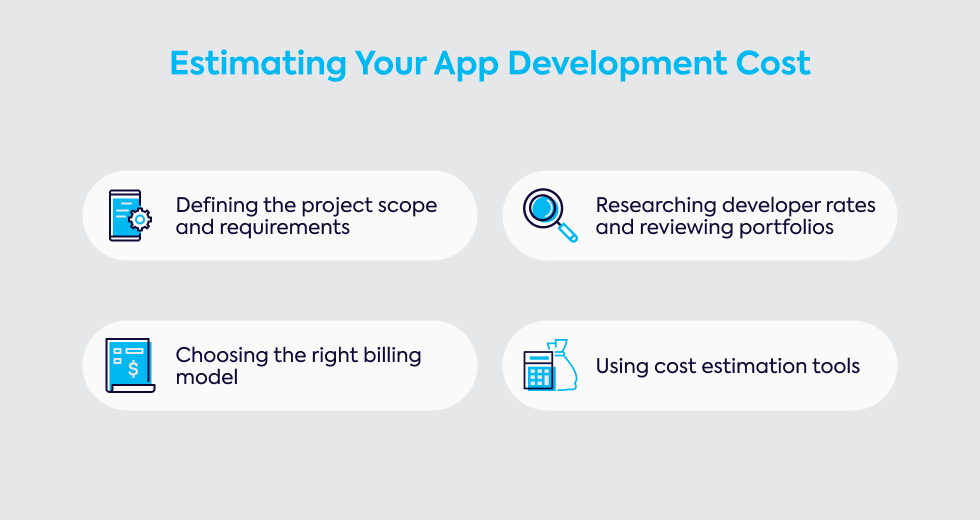
Additional Costs Beyond Development
Onboarding and Training Expenses
When you bring on a new app developer, some initial onboarding costs are necessary to ensure they’re ready to contribute effectively.
These training expenses for app developers typically range from $1,000 to $5,000 or more per developer, depending on project complexity and the amount of training required.
Onboarding often includes training on company-specific tools and processes, as well as pair programming sessions for hands-on guidance.
Orientation also involves dedicated time for existing team members to introduce project details and workflows, along with team integration expenses to ensure the developer understands the team’s style and goals.
Long-term projects may require higher initial orientation costs to establish alignment and productivity for the duration of the project.
Overall, these developer onboarding costs are an investment in seamless teamwork and a smooth transition into development.
Required Equipment and Software
Developing high-quality apps requires appropriate equipment and tools.
Developer equipment costs often start with high-performance hardware, including computers, tablets, and testing devices, which may range from $2,000 to $5,000 per developer.
In addition, software licenses for app development are another consideration, costing around $1,000 to $3,000 annually per developer.
This includes IDEs, design tools, and testing software like Xcode, Android Studio, or GitHub.
In modern development settings, cloud service expenses are necessary to support development and testing, with costs between $100 and $500 per developer each month for services such as AWS, Google Cloud, or Azure.
Other essential mobile app development tools include monitors, keyboards, and mice, adding an extra $200 to $500 for each developer.
These hardware costs and tools help keep development efficient and ensure your team has what it needs to work at full capacity.
Project Management and Collaboration Tools
Working effectively on a development project requires solid project management tools and collaboration software.
For documentation and managing design specifications, teams often use Google Workspace or Confluence, which can cost between $50 and $200 monthly per team.
Effective app development collaboration also involves using communication tools like Zoom or Slack, ranging from $20 to $100 per user each month, which keep messaging, video calls, and project discussions organized.
To monitor progress, assign tasks, and manage resources, app development tracking tools like Jira, Trello, or Asana are commonly used, with prices from $10 to $50 per user each month.
Additionally, support from project managers, tech writers, or IT staff might be required, which can raise costs depending on project size and specific needs.
Investing in collaboration platforms for app development helps ensure your project stays on track and that communication is clear and efficient.
Security and Compliance Considerations
Ensuring security is essential, and the associated app security costs can add to your overall expenses.
Security measures might include data encryption expenses and secure authentication to protect users and information.
Compliance with regulations like GDPR or HIPAA is often required, which means you’ll need compliance protocols and coding practices that meet these standards.
To keep the app secure, security audits for app vulnerabilities are also common, involving periodic checks to identify and address weaknesses.
These audits are an important part of maintaining security standards over time.
Additional ongoing security updates are needed to keep the app protected from new threats and potential data breaches, making security a continuous, proactive cost.
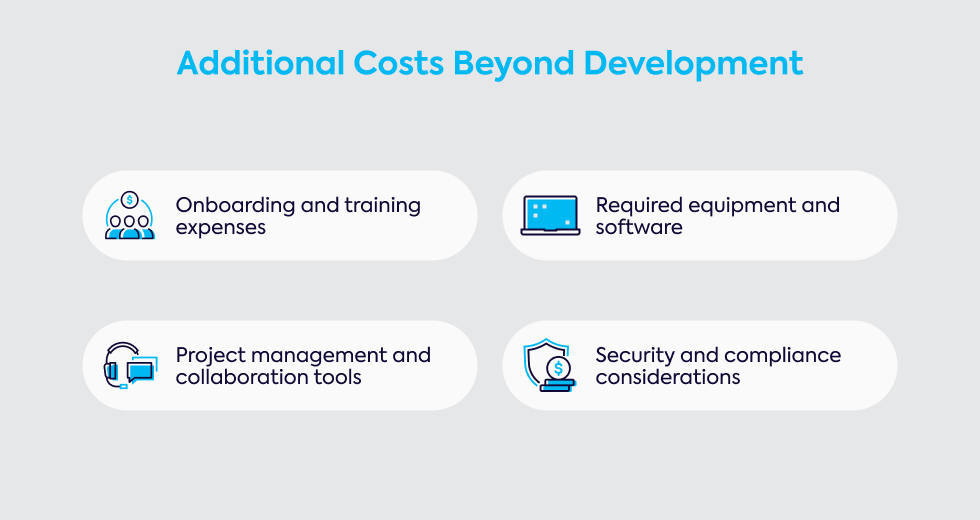
Average Cost Estimates by Region
North America
Mobile app development in North America is known for its high rates. In the United States, the cost to hire an app developer typically falls between $37 and $77 per hour, with an average around $53 per hour.
Major markets like California and New York often see the highest rates due to demand and living costs.
In Canada, rates range from $31 to $65 per hour, slightly lower than in the US but still high due to the skilled talent pool.
The US app development costs are usually even higher when working with senior developers or established agencies, where rates can reach $90 to $150 or more per hour, especially for complex projects.
The app developer cost in 2024 will likely reflect these trends as demand for local development talent continues to grow.
Latin America
Latin America provides competitive developer pricing in LATAM, making it an appealing choice for those looking to balance cost with quality.
In Brazil, rates generally range between $21 and $52 per hour, with a regional average around $32.
Argentina offers similar affordability, with rates between $19 and $49 per hour and an average of $29, making it popular for nearshore app development.
Colombia and Mexico offer hourly rates from $18 to $60, with Mexico averaging $32 per hour.
These Latin American app development costs remain lower than those in North America, yet developers in this region are skilled and provide effective solutions.
Outsourcing to Latin America has become increasingly popular among North American companies for these reasons.
Western and Northern Europe
App developer cost in Western Europe can vary, but the demand for skilled developers keeps rates on the higher side.
In the United Kingdom, developers typically charge between $28 and $60 per hour, with an average of $39 per hour.
In Germany, rates range from $32 to $56, averaging around $45, while Ireland’s rates are slightly higher due to the country’s tech hub status.
Northern Europe developer rates tend to be consistent, with Norway, Sweden, and Denmark averaging between $30 and $58 per hour.
Switzerland’s average is higher, with rates from $38 to $72, reflecting its strong economy.
For those seeking affordable development in Europe, considering various app development hubs in Europe can provide a mix of quality and competitive rates.
Central and Eastern Europe
Eastern Europe app development rates offer some of the best value for money, balancing quality with affordability.
In Poland, rates are between $23 and $50 per hour, with an average around $35.
This region is known for competitive app developer rates, as developers here often bring strong technical skills at lower costs than in Western Europe.
In countries like the Czech Republic, Romania, and Hungary, rates generally range from $22 to $50 per hour, with Romania averaging $33.
Ukraine is another popular choice for cost-effective outsourcing, with rates between $19 and $50 per hour and an average of $29.
These countries have become popular developer destinations in Eastern Europe due to their combination of skill and competitive pricing.
Middle East and Africa
Middle East developer rates vary significantly by country.
In Turkey, developers charge between $19 and $45 per hour, while in Israel, rates range from $31 to $75, reflecting its advanced tech industry.
UAE developers usually charge between $26 and $48 per hour, with app development pricing in Israel being among the highest due to specialized expertise.
In Africa, affordable development in Africa can be found, with Egypt’s rates around $15 to $40 per hour and Morocco’s from $16 to $42.
These app developer rates in MENA are generally lower than in other regions, making it a cost-effective choice for simpler projects.
However, access to skilled developers can vary widely, so it’s important to consider the specific expertise you need.
Southeast Asia and Oceania
Southeast Asia app development rates are some of the most budget-friendly globally.
In India, hourly rates range from $8 to $45, averaging around $19.
This makes India a popular destination for affordable Asian developers.
The Philippines also offers competitive rates, between $8 and $40 per hour, with an average of $20, and has a strong English-speaking workforce, which aids communication.
Vietnam and Bangladesh, with rates ranging from $7 to $40 per hour and an average around $19, are becoming popular for budget-friendly developers in Asia.
In Oceania, Oceania developer rates are closer to North American levels, with Australian developers charging $33 to $65 per hour and New Zealand rates ranging from $29 to $60.
Singapore stands out in Southeast Asia for higher costs, with rates of $25 to $60 due to its advanced economy and higher living costs, impacting app development cost in India and surrounding countries.
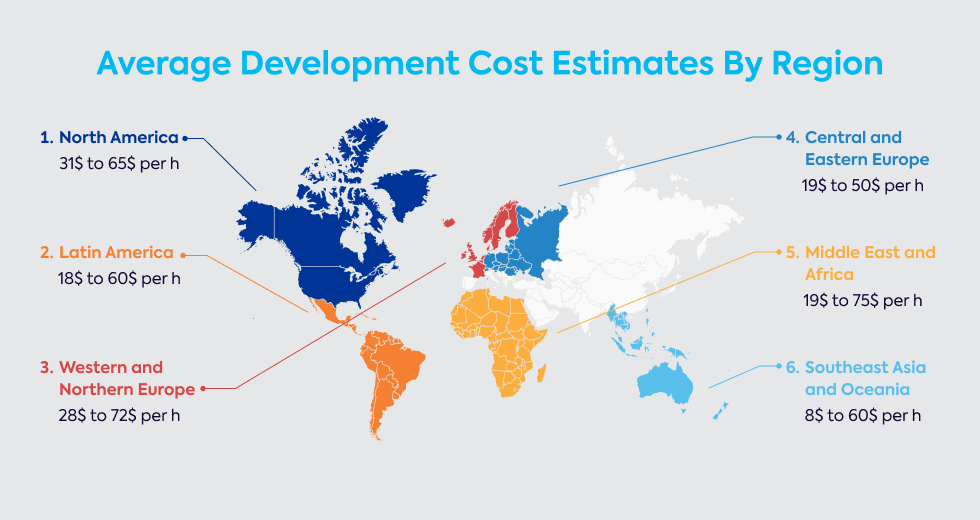
Selecting the Right Developer for Your Project
Freelancers vs. Development Agencies
When you want to hire a mobile app developer, choosing between freelancers for app development and development agencies is a key decision.
Freelancers typically offer lower hourly rates, ranging from $15 to $80 per hour, and are often suitable for short-term projects or specific tasks.
However, freelancers may need more oversight, especially if they’re handling multiple projects, and may lack resources for extensive support.
Agency vs freelancer decisions hinge on project complexity.
Development agencies cost more, with rates between $50 and $250 per hour, but they provide a complete mobile app development company structure, including project management, testing, and quality assurance.
Agencies are usually better suited for complex or long-term projects and often come with dedicated project managers, giving you a structured team approach.
Freelancers may work best for prototype builds or small apps, though there can be communication challenges, especially with offshore teams.
Agencies, while pricier, can handle higher complexity projects, providing more resources for support and maintenance.
Comparing freelancer rates to agency costs gives you a better understanding of the trade-offs in development agencies comparison for your specific needs.
Evaluating Portfolios and Previous Projects
When selecting a developer, taking time to review app developer portfolio examples is essential.
Look at app development projects they have completed and see if there is a match in terms of industry or technical requirements, such as eCommerce, healthcare, or gaming apps.
Evaluate the past developer projects to assess their experience with similar app types and whether they have worked on both simple and complex applications.
Checking for relevant experience in areas like UI/UX, API integrations, or real-time data processing can confirm the developer has the skills you need.
Additionally, reading client reviews and testimonials reveals patterns in performance, reliability, and client satisfaction.
Confirming the developer or agency’s understanding of the app development lifecycle is critical, particularly for testing and post-launch support.
Look for experience with relevant technologies, including frameworks like React Native, Swift, Kotlin, and Flutter, and specialized fields like AI or AR/VR.
Assessing these areas helps ensure they meet your quality assurance in app development needs.
Conducting Technical Interviews
When it’s time to hire, a technical interview for developers can provide insight into their skills and compatibility with your project.
Ask about their expertise with core app development skills and the specific languages or frameworks your project requires, like JavaScript, Swift, or Kotlin.
Assessing the developer’s understanding of system architecture is also important, particularly if your app requires scalability or has specific security needs.
Scenario-based questions can help reveal their problem-solving approach for issues like performance optimization or data storage solutions.
Inquiring about testing protocols and experience with app testing tools (such as JUnit, XCTest, and Espresso) helps confirm their quality assurance skills.
For agencies, it can be helpful to interview project managers to understand their communication methods, project tracking processes, and how they handle potential delays.
Discussing developer debugging expertise and knowledge of secure practices, such as secure app data handling and compliance with GDPR, will give you peace of mind in terms of reliability and security.
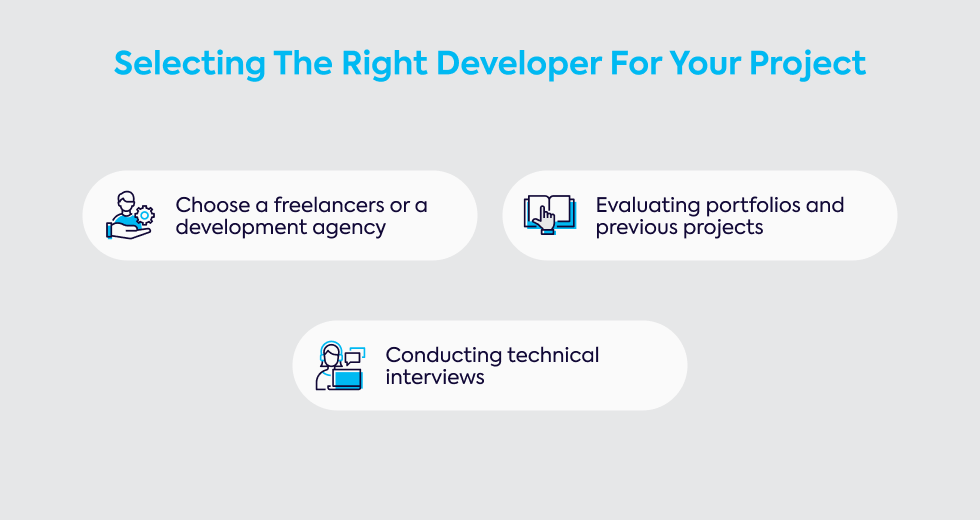
Tips to Optimize Hiring Costs
Setting a Clear Project Scope
A well-defined scope can keep your project on budget and on track.
Begin with your app development goals by clearly defining app features and determining the project’s purpose.
Understanding your audience through user persona insights is also helpful, as it provides direction for core user flows and design decisions that match user expectations.
Consider categorizing each feature by its complexity—labeling them as basic, moderate, or advanced can clarify priorities and help in functionality categorization.
This also allows you to identify essential features versus nice-to-haves, which makes future scaling easier.
A project phase breakdown also adds clarity, dividing the project into stages such as planning, design, development, testing, and deployment.
Addressing ongoing maintenance at this stage can also prevent unexpected costs after launch.
Establishing project scope clarity early reduces the chances of unplanned expenses, keeps development focused, and makes it easier to get accurate quotes from developers.
Using Agile Methods for Budget Control
Adopting an agile approach can improve budget control with sprints, helping you stay flexible while managing costs.
Agile development breaks down work into small sprints or phases, each with its own set of deliverables.
This allows you to evaluate progress and adjust priorities to keep the project moving forward effectively.
During each sprint, you have the opportunity to reassess features and make sprint-based adjustments that align with user feedback, avoiding the need for costly rework.
Agile’s flexibility is especially useful in cost-effective app iteration, where smaller, frequent updates keep expenses manageable while refining features based on real-time insights.
Using agile also enables phased budget allocation, where costs align with evolving project priorities.
With agile, you’re better equipped for iterative app development that stays within budget, even as requirements change over time.
This approach suits complex projects with multiple updates and can be invaluable for keeping your financial resources under control.
Negotiating Rates Effectively
When it comes to rate negotiation tips, research is essential.
Start by gathering information on average developer rates based on region, experience, and skill level to establish a benchmark.
This foundation helps during discussions about bulk project pricing, which may lead to discounts if you’re committing to a long-term project or high volume of work.
Being transparent about your app costs and clarifying expectations early on is key.
This includes setting clear milestones and identifying any extra costs, such as software licenses or additional development hours for rework.
Establishing a clear payment schedule with milestones ensures that both you and the developer maintain control over the project and the budget.
For cost reduction strategies, fixed-rate contracts are ideal for projects with a clear scope and timeline, while hourly rates work well for projects that may need adjustments as they progress.
Completing thorough developer rate research beforehand helps ensure you choose the rate structure that aligns best with your project’s goals.
Choosing a Cost-Effective Region
To maximize your budget, it’s worth exploring cost-effective hiring regions.
Some regions offer high-quality services at affordable rates, making it easier to find the right balance of cost and quality.
Southeast Asia offers some of the most competitive rates, with app developer affordability by region averaging $8 to $45 per hour for entry- to mid-level complexity projects.
India, the Philippines, and Vietnam are known for being particularly budget-friendly.
Central and Eastern Europe also provides affordable yet skilled developers, with rates between $20 and $55 per hour in countries like Poland and Ukraine.
This region offers a regional developer costs comparison that reflects strong technical talent at reasonable rates, making it ideal for mid-level complexity projects.
For those seeking budget-friendly outsourcing options closer to North America, South America (Brazil, Argentina, Mexico) provides rates ranging from $18 to $52 per hour, with minimal timezone differences, making collaboration easier.
Meanwhile, North America and Western Europe tend to be costlier but are ideal for complex projects needing top-tier experience.
Evaluating these global developer pricing analysis options can help you select a location that aligns with your project’s budget and needs.
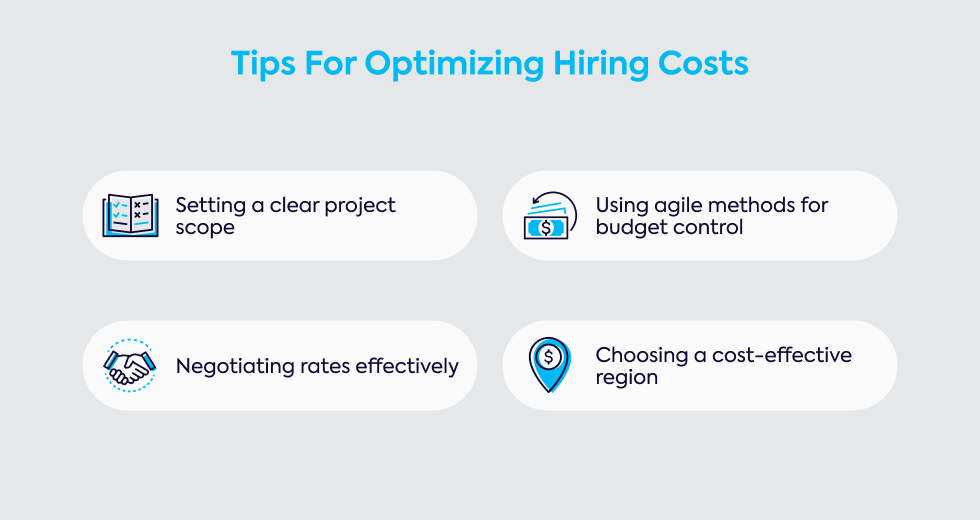
How Much Does It Cost to Hire an App Developer - Frequently Asked Questions
How do different platforms impact the cost?
The platform selection costs can vary significantly based on whether you’re developing for iOS, Android, or a cross-platform solution.
iOS development cost generally ranges from $30 to $150+ per hour, often lower than Android due to Apple’s more streamlined guidelines and shorter testing cycles.
Android development budget can be slightly higher, ranging from $25 to $150+ per hour, as developers may need to test across a broader variety of devices, which adds time.
For those looking to develop for both platforms, cross-platform benefits offer a cost-effective solution with hourly rates between $40 and $120.
Frameworks like Flutter or React Native allow you to create a single codebase that works across both iOS and Android, which can reduce costs compared to creating separate native apps.
If cost savings are a priority, hybrid vs native cost savings may be worth considering.
Hybrid apps, built using frameworks like Ionic or PhoneGap, can reduce development costs by up to 30–40%, though they might sacrifice some performance or user experience.
PWA development cost tends to be even lower, allowing for faster deployment across devices and platforms, making PWAs a good choice for limited budgets or quick launches.
What are typical hiring timelines for developers?
Hiring timelines for developers vary depending on whether you’re hiring a freelancer, agency, or in-house team.
Freelancers can often be hired within days on platforms like Upwork or Fiverr, making them a good choice for short-term projects or when you need rapid development.
Freelancer vs agency hiring time also differs, as agencies typically take 1–2 weeks to screen, negotiate, and set up contracts, but they offer pre-screened teams with management support.
In-house hiring, on the other hand, can take up to 4–8 weeks when you factor in recruitment, interviewing, and onboarding duration.
This approach works best for long-term projects that require extensive oversight.
For project timelines, estimated project duration for simple apps is around 200–400 hours, moderate apps around 500–800 hours, and complex apps 1000+ hours, though exact time varies based on scope.
For projects needing consistent development or support over time, retainer agreements can provide a month-to-month structure, which many agencies support for projects that extend beyond six months. Retainers are often ideal for larger projects needing ongoing updates.
How can I ensure quality within my budget?
Ensuring quality within a set budget starts with a clear project scope definition.
Defining core features and functions upfront helps avoid “scope creep” that leads to unplanned expenses.
Focusing on an MVP (Minimum Viable Product) can control costs by limiting initial features to only the essentials, with additional features added later as updates.
Choosing a platform carefully also makes a difference.
Starting with either iOS or Android instead of both, or opting for cross-platform solutions, can reduce initial expenses.
For well-defined projects, fixed-price contracts are effective, as they offer predictable costs without scope changes.
Negotiating based on market rates helps keep costs fair and within reach.
Prioritizing essential features keeps the development focused on core functionalities, allowing non-essential ones to be saved for future versions.
Reviewing developer portfolios for relevant experience and matching their past work to your project needs also supports quality without overextending your budget.
Finally, agile development efficiency allows for ongoing adjustments and reduced rework, making sure resources are allocated effectively across project phases and iterative sprints.
Navigating App Development Costs with Gauss: Expert Support from Start to Launch
If you're ready to turn your app idea into a reality but aren't sure where to start, Gauss can help.
Our expert app development team has extensive experience navigating the complexities of the mobile app development process—from defining project scope to selecting the right development platform and managing regional pricing differences.
Whether you're looking for an affordable software developer to match your budget or a team to tackle a complex, high-stakes project, Gauss is here to guide you every step of the way.
Let's start a conversation about your vision! Contact Gauss today to discuss how we can help bring your project to life, within budget and on time.
